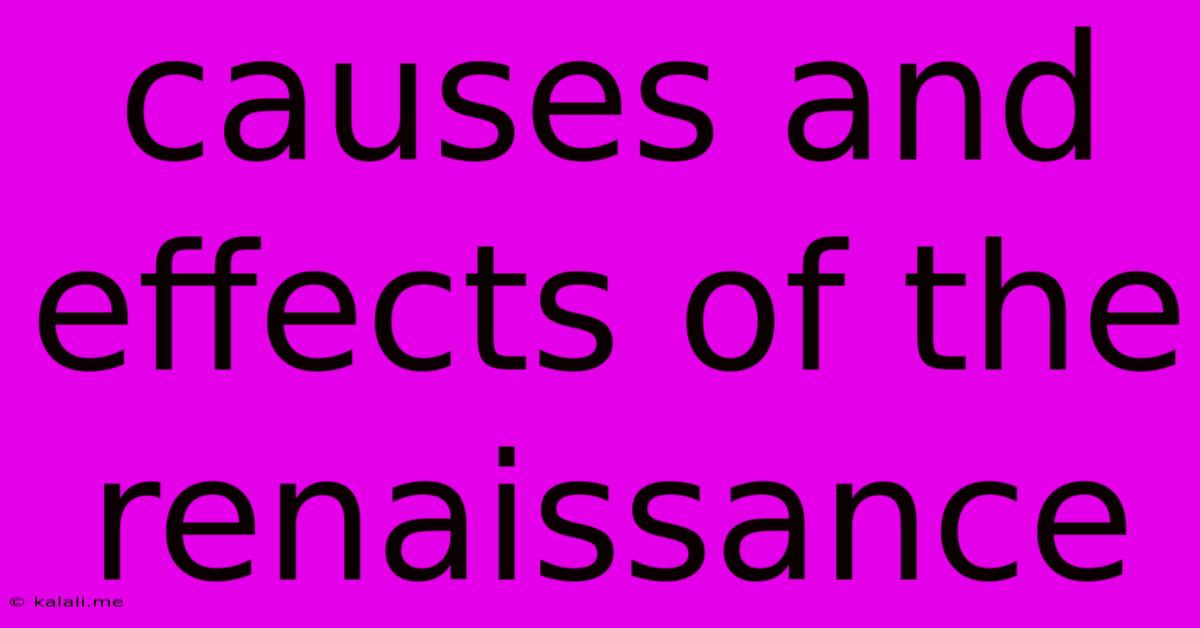Causes And Effects Of The Renaissance
Kalali
Jun 14, 2025 · 4 min read

Table of Contents
The Causes and Effects of the Renaissance: A Rebirth of Art, Science, and Culture
The Renaissance, meaning "rebirth" in French, was a transformative period in European history, spanning roughly from the 14th to the 17th centuries. This era witnessed a flourishing of art, literature, and intellectual pursuits, marking a significant shift from the medieval period. Understanding the causes and effects of this remarkable era is crucial to grasping its enduring legacy. This article delves into the multifaceted factors that fueled the Renaissance and its lasting impact on Western civilization.
The Seeds of Change: Causes of the Renaissance
Several interconnected factors contributed to the blossoming of the Renaissance. These weren't isolated events, but rather a confluence of circumstances that created a fertile ground for innovation and intellectual exploration:
1. Rediscovery of Classical Learning: The rediscovery of classical Greek and Roman texts, largely preserved in monasteries and Byzantine libraries, sparked a renewed interest in classical philosophy, literature, and art. Scholars meticulously translated and studied these works, leading to a revival of humanist ideals emphasizing human potential and achievement. This rediscovery fueled intellectual curiosity and laid the groundwork for new scientific and artistic approaches.
2. The Rise of Humanism: Humanism, a philosophical movement emphasizing human values and potential, became central to the Renaissance spirit. Humanists shifted focus from solely religious concerns to the study of human nature, ethics, and worldly affairs. This led to a greater appreciation for individual talent and achievement, fostering creativity and innovation in various fields.
3. Economic Growth and the Rise of City-States: The growth of trade and commerce, particularly in Italian city-states like Florence, Venice, and Genoa, generated significant wealth. This prosperity fueled patronage of the arts and sciences, allowing artists and intellectuals to flourish. Powerful merchant families, like the Medici in Florence, became crucial patrons, commissioning magnificent works of art and supporting intellectual endeavors.
4. The Black Death's Unexpected Contribution: Paradoxically, the devastating Black Death of the 14th century inadvertently contributed to the Renaissance. The plague decimated the population, leading to labor shortages and increased demand for skilled workers. This empowered the surviving populace, leading to social mobility and a questioning of traditional hierarchies.
5. The Invention of the Printing Press: Gutenberg's invention of the printing press in the mid-15th century revolutionized the dissemination of knowledge. The ability to mass-produce books made information more accessible to a wider audience, fostering literacy and accelerating the spread of new ideas.
A World Transformed: Effects of the Renaissance
The Renaissance profoundly impacted various aspects of European society, leaving a legacy that continues to shape our world today:
1. Artistic and Architectural Revolution: The Renaissance witnessed an unparalleled explosion of artistic innovation. Masters like Leonardo da Vinci, Michelangelo, and Raphael produced breathtaking works of art that redefined artistic techniques and perspectives. Architectural styles also underwent a dramatic transformation, moving from the Gothic style to a renewed emphasis on classical forms.
2. Scientific Advancements: The Renaissance sparked a scientific revolution. Thinkers like Nicolaus Copernicus and Galileo Galilei challenged established scientific theories, paving the way for the scientific method and modern science. This period marked a shift from relying solely on religious dogma to emphasizing observation and experimentation.
3. Exploration and Expansion: The Renaissance spirit of exploration and discovery fueled voyages of exploration to the New World and beyond. These voyages expanded European influence globally, leading to both cultural exchange and exploitation.
4. Political and Social Change: The Renaissance challenged traditional political structures and social hierarchies. The rise of powerful city-states and the increasing influence of merchant classes contributed to the development of more complex political systems. Humanist ideals also fostered a renewed emphasis on individual rights and freedoms.
5. Lasting Legacy: The Renaissance's impact extends far beyond the historical period itself. Its emphasis on humanism, reason, and individual achievement continues to influence our values and ideals. The artistic and scientific advancements of the Renaissance laid the foundations for the Enlightenment and the modern world.
In conclusion, the Renaissance was a complex and multifaceted period driven by a confluence of factors. Its profound effects on art, science, politics, and society continue to resonate today, making it a pivotal era in human history. The exploration of its causes and effects provides invaluable insights into the evolution of Western civilization and the enduring power of human creativity and intellectual curiosity.
Latest Posts
Latest Posts
-
Approximately How Many Elements Occur Naturally On Earth
Jun 15, 2025
-
What Is 10101010 In Decimal Format
Jun 15, 2025
-
Common Multiple Of 28 And 98
Jun 15, 2025
-
Which Of The Following Is Not True Of Organelles
Jun 15, 2025
-
Oxidation State Of C In Ch4
Jun 15, 2025
Related Post
Thank you for visiting our website which covers about Causes And Effects Of The Renaissance . We hope the information provided has been useful to you. Feel free to contact us if you have any questions or need further assistance. See you next time and don't miss to bookmark.